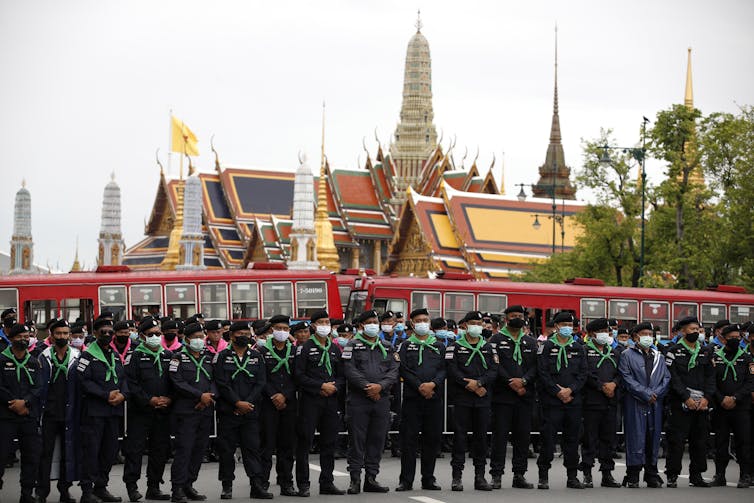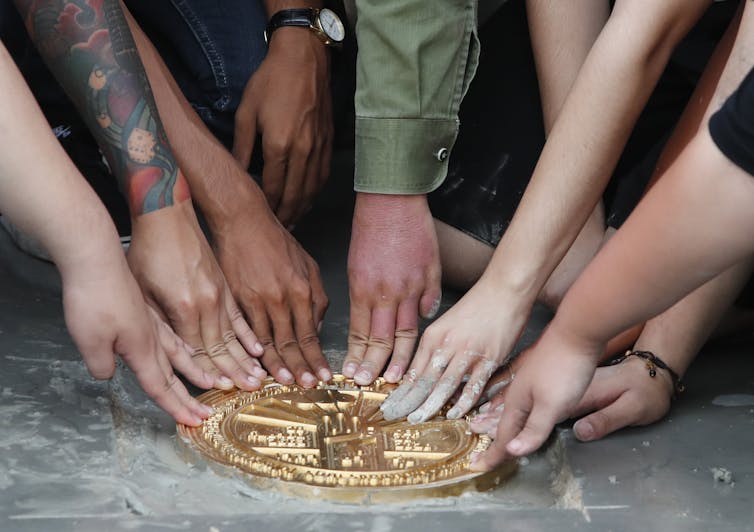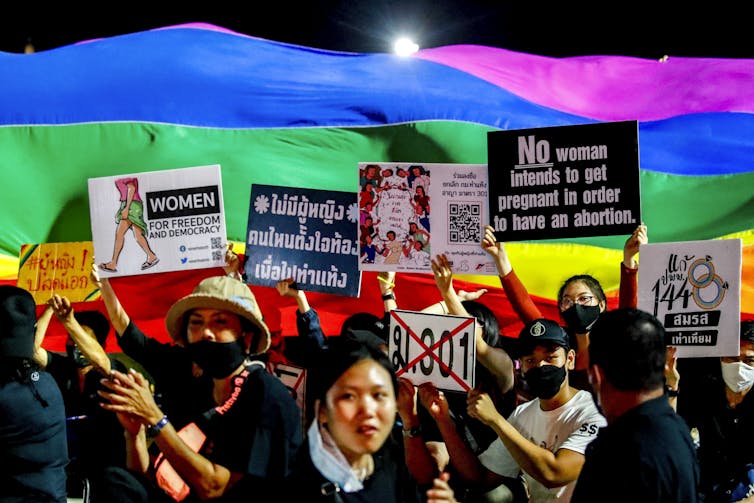Why young Thais are no longer afraid to take on the monarchy
- Written by Greg Raymond, Lecturer, Australian National University
Thousands of Thai students turned out over the weekend to protest[1] in Bangkok — the latest gathering in a long-simmering movement against the power structures that hold sway in Thailand.
The three core demands of students are to dissolve parliament, amend the constitution and for the government to stop harassing dissidents and others.
The protests began in January, took a break during the COVID-19 outbreak and then resumed in July.
One of the triggers was the disappearance and apparent abduction[2] of political activist Wanchalearm Satsaksit in Cambodia on July 4.
More broadly, protesters are angry at the perceived illegitimacy of the government (headed by the leader of the 2014 coup Prayuth Chan-ocha[3]), the dissolution[4] of leading reform party Future Forward and the government’s performance in handling the economic impacts of the coronavirus.
In the past month, protesters have also begun demanding reform of the monarchy[5] — a topic long deemed unmentionable in a country with strict laws against criticising the royal family.
Where the protests go from here remains to be seen, but so far, the government has exercised relative restraint toward the gatherings, preferring to arrest[6] leaders one by one away from the demonstrations and avoid street clashes.
But the protesters have made one thing clear: they will no longer be ruled by fear. And some believe the public airing of grievances about the monarchy marked a turning point.
 Police stand guard outside the Grand Palace in Bangkok. RUNGROJ YONGRIT/EPA
Police stand guard outside the Grand Palace in Bangkok. RUNGROJ YONGRIT/EPA
Why symbolism matters in Thailand
The weekend protests were heavy on symbolism. They were held at the Royal Plaza, commonly known as Sanam Luang, which has been used for decades for both royal ceremonies and activities such as kite flying. It has also been an important site for exercises of power and protest[7].
Public access to Sanam Luang has been restricted in recent years, so to reclaim the square was itself a highly meaningful gesture.
The protesters also staged a ritual: the laying of a new People’s Plaque[8] in the square. The new plaque read
at this place the people have expressed their will: that this country belongs to the people and is not the property of the monarch, as they have deceived us.
 Students install the new plaque declaring ‘This country belongs to the people’. By the next day, it was gone. Sakchai Lalit/AP
Students install the new plaque declaring ‘This country belongs to the people’. By the next day, it was gone. Sakchai Lalit/AP
To appreciate the significance, some historical context is important. The original People’s Party Plaque was laid in 1936 to commemorate Thailand’s the abolition of the absolute monarchy and the establishment of its first constitution four years earlier. It read[9]:
Here, at dawn on 24 June 1932, the People’s Party has brought forth a constitution for the progress of the nation.
This plaque disappeared[10] mysteriously in 2017, shortly after the death of Thailand’s long-serving and much-revered king, Bhumipol Adulyadej, and the instalment of his successor, Crown Prince Vajiralongkorn.
The disappearance of the plaque was part of a pattern[11] of vanishing monuments related to the 1932 revolution. No public statement was made about the disappearance of the plaque and no individual or agency took responsibility.
In laying the new plaque over the weekend, the protesters invoked the spirit of all Thais who had fought for democracy in the past, including the revolutionaries Pridi Banomyong and Phibun Songkram[12].
They also included representations from minorities, such as the LGBTI community, and those from Thailand’s northeast and far-southern provinces. These groups are widely believed to have been disenfranchised under Thailand’s military government and its creeping authoritarianism.
 The protests have drawn wide support from young Thais, including those calling for equal rights for LGBTQ people. DIEGO AZUBEL/EPA
The protests have drawn wide support from young Thais, including those calling for equal rights for LGBTQ people. DIEGO AZUBEL/EPA
The plaque itself displayed the three-fingered “Hunger Games salute[13]”, widely used by protesters since the 2014 coup and representing the values of freedom, equality and brotherhood/sisterhood.
The new plaque was not long for Royal Plaza, though. Within a day, it had been quickly removed[14] and replaced with cement.
Worries about erosion of democratic freedoms
There has been increasing unease among younger Thais at these clandestine efforts by the military-backed government to erase the memory of Thailand’s democratic birth.
The younger generation voiced their frustrations[15] with the government and the eroding democratic freedoms in the country in the lead-up to the 2019 election — the first vote in Thailand since the coup.
They voted in droves for Future Forward, a party whose key message was no more coups. But Prayuth, the leader of the junta that seized power in 2014, was nonetheless chosen as the new prime minister[16] by the parliament last June.
Read more: Seeking more power, Thailand's new king is moving the country away from being a constitutional monarchy[17]
Future Forward was then dissolved[18] on a legal technicality in February, suggesting Thailand is adopting the sophisticated authoritarianism[19] of its neighbour Cambodia.
There have also been fears Thailand’s rulers are only superficially abiding by the constitution.
One example was Prayuth’s refusal[20] to promise to uphold the constitution during his swearing-in ceremony.
This followed King Rama X’s decision[21] to amend the constitution unilaterally after it had been approved by the people by referendum.
Political uncertainty in Thailand: mass demonstrations and new lines of debate.Where do the protests go from here?
The plaque-laying students will likely face repercussions, although they probably will not be charged with lèse majesté[22]. Since taking the throne, Rama X has indicated a strong preference against using these laws. The government has many other legal instruments at its disposal, such as charging protesters with sedition.
While momentum for constitutional reform is starting to gather pace in the parliament, concrete action on reforming the monarchy will be slower and more difficult. The students say their wish is not for a republic, but for a monarchy above politics and below the constitution.
Read more: Thailand's controversial king-to-be faces a challenge to gain the people's respect[23]
As the country’s next generation of leaders in waiting, it seems inevitable that change in this direction will occur.
The students are next calling for a nationwide strike[24] on October 14, another day redolent with symbolism. It was on this day in 1973 the Thai people overthrew a military dictatorship[25].
References
- ^ protest (www.nytimes.com)
- ^ disappearance and apparent abduction (www.bbc.com)
- ^ Prayuth Chan-ocha (www.bbc.com)
- ^ dissolution (www.bbc.com)
- ^ reform of the monarchy (www.theguardian.com)
- ^ arrest (www.npr.org)
- ^ power and protest (www.jstor.org)
- ^ People’s Plaque (www.bbc.com)
- ^ It read (prachatai.com)
- ^ disappeared (www.khaosodenglish.com)
- ^ pattern (prachatai.com)
- ^ Pridi Banomyong and Phibun Songkram (kenlwrites.com)
- ^ Hunger Games salute (www.bbc.com)
- ^ quickly removed (www.bangkokpost.com)
- ^ voiced their frustrations (edition.cnn.com)
- ^ new prime minister (www.nytimes.com)
- ^ Seeking more power, Thailand's new king is moving the country away from being a constitutional monarchy (theconversation.com)
- ^ dissolved (www.bangkokpost.com)
- ^ sophisticated authoritarianism (www.cambridge.org)
- ^ refusal (www.straitstimes.com)
- ^ decision (theconversation.com)
- ^ lèse majesté (www.bbc.com)
- ^ Thailand's controversial king-to-be faces a challenge to gain the people's respect (theconversation.com)
- ^ nationwide strike (www.thaiexaminer.com)
- ^ overthrew a military dictatorship (www.nytimes.com)













